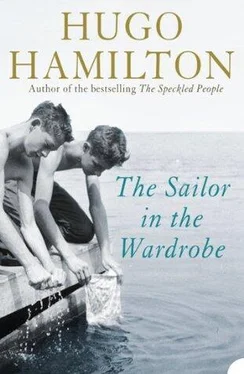When they invaded the North, my father was wearing a dark suit and a white shirt and tie. He wore a loose tweed cap that seemed a little too big for him and made him look like a boy. He had a tweed coat over the side of his arm and he was walking with a group of people, smiling and talking, following behind Gearóid. He was the head of the movement called Aiseirí and they were all getting on the train in Dublin, going to Belfast. You can see them in colour because there was a man travelling with them all the way who was making a film of the whole thing. They sometimes smile towards the camera, but mostly they walk with great determination and seriousness, because there’s no turning back and they know exactly what they’re doing, going to the North to tell people there what a beautiful country Ireland is going to be and you’d be mad not to be Irish.
On the train, my father is looking out the window with his tweed cap still on. It looks like the journey doesn’t take very long, because they’re already getting off the train again, walking along a country road crossing the border with cows in the fields and people following them. They walk right into the North and nobody can stop them. They get to Newry where they make some speeches with a small crowd of people listening to them and two officers from the Royal Ulster Constabulary watching with their hands behind their backs.
Then they arrive in Belfast. My father and the other men and women with him take placards and banners from the boot of a car and erect them on a street of red-bricked houses. Gearóid, the leader, speaks through a megaphone at a group of bystanders, mostly children and dogs who have nothing better to do than to watch people coming to make noise. The bystanders look like they’re not really that interested and there’s no need for the megaphone. My father is walking around with his limp, trying to sell copies of the Aiseirí newspaper under his arm and handing out leaflets to anyone who is willing to take one. Leaflets with drawings of bomber planes throwing down green fliers with the words ‘Speak Irish’ written on them. It was the Germans bombing the British cities and the British bombing the German cities and the Irish bombing everywhere with leaflets for the Irish language.
It was their crusade to Belfast. My father has told me many times before, that it doesn’t matter if they don’t listen, because sooner or later they will see the truth and join in. They’ll all be with us one of these days. They told the people of Belfast that your language was your homeland. That’s why the Loyalists in the North were so lost and confused, because they had no homeland of their own, only keeping with Britain across the water. They were afraid to be Irish, but once they realized that Ireland was a country with its own language, just like France or Germany or Israel, then they would be delighted with the idea. They would soon be rushing to join us and the whole country would be united again. All the Loyalists would be speaking Irish. Nothing was more certain. It was all about persuasion rather than force. Even though it was funny to invite people into the republic of Ireland who hated the place, things would change soon when they saw how happy we were in the south. One of these days the Loyalists would no longer be afraid of admitting that they were Irish underneath.
But then the RUC policemen had enough of Gearóid and his followers on the streets of Belfast, making speeches about the Queen of England and passing around leaflets of Irish bomber planes and giving out free stamps of the red hand of Ulster crossed out with a big black X. So they arrested Gearóid, the leader, and put him in Crumlin Road jail for a while to think things over. When he was released and expelled at the border, long after my father and the others had gone home, they told him never to come back, even though he was born in Belfast and grew up there.
After that, Gearóid was so angry at being kicked out of his own country, that he vowed that the next time he would go back, it would be with a hundred thousand armed men behind him. He went around telling people that they were still a cultural organization, but very soon they would be mobilizing an army.
When the Second World War started and my mother was still trapped in Germany, the papers were saying that the Germans would invade Britain and Ireland as well. De Valera, who was the Taoiseach at the time, kept Ireland neutral and made sure that the Irish people would not be dragged into the war on the side of the British or the Germans, for the Allies of the Nazis. The Irish had just liberated themselves from the British and they didn’t want to get into another war. It was somebody else’s fight, and we should keep out of it.
There were some people like Gearóid who wanted the Germans to invade Ireland. He was going around the country, telling soldiers in the Irish army that when the Germans arrived, they should not resist but join in with them. Of course, they didn’t want to be invaded again so soon after getting rid of the British, but if the Nazis were to come to Ireland, they would actually do us a lot of favours. According to Gearóid and his followers in Aiseirí, the Nazis would unite Ireland. They would sort out the problem of Northern Ireland and put an end to British imperialism for good. It would be replaced by Nazi imperialism, but we would have a United Ireland and it would be the Irish language and the German language which would dominate all around the country. It was clear that they might have to hand over the Jews that were living in Ireland at the time. Some of the members of the movement were making speeches against the Jews. As long as the Northern question was sorted out and there would be no more bigotry and apartheid rule by Protestant Loyalists, they didn’t care what happened to the Jews. It seemed like a simple solution, a moral compromise.
Back then, my father learned German and maybe that’s why Gearóid liked him and gave him a job as treasurer of the party, as his right-hand man. My father loved German culture and dreamed of Ireland being a strong and vibrant nation once again. Like others in the party, they believed that Ireland needed a strong leader who would set aside all the self-doubt that riddled the country and still made it half-British. When it became clear that Hitler already had too much to deal with elsewhere and that Ireland was the last thing he needed to add to his problems, Gearóid and others in the party began to despair and think the Northern Ireland question would never be solved. The golden moment was gone. Because they had to do it alone without any help from outside, Gearóid then went around saying to people in private that he was going to move towards an armed revolution. He canvassed for new members, saying officially that it was exclusively a cultural movement, but quietly he was telling them the opposite, that he would be arming the movement very soon, while Britain was still at war and the last thing Churchill would need is another sideshow with the Irish.
Gearóid wanted to show that his party was the one to be feared most in the future. His party was responsible for damaging the Gough monument in Phoenix Park and also for a riot outside the Metropole cinema on O’Connell Street in which there was a baton charge by the Gardai. The Aiseirí newspaper talked about war preparations in Ireland and Gearóid was making speeches about going back up to Belfast very soon with force of numbers, armed to the teeth. But the first weapons they actually got in their fight to liberate Northern Ireland were not rifles but hobnail boots. Hobnail boots and rebel songs. It was said that young members of Aiseirí had begun to act like the Brown Shirts, going around disrupting other peaceful party gatherings by kicking onlookers in the shins and ankles. There was quite a bit of kicking going on at the time and it was said that De Valera’s party, Fianna Fail, had introduced the hobnail boot into Irish politics. They had their own gangs going around the country making an awful racket as they went through the streets. Some people said it was all just schoolboy stuff and that Ireland was never likely to imitate Germany. They said that Aiseirí was insignificant, but maybe they were missing the point because Ireland was lucky that Aiseirí never came to power, that Gearóid never got his hundred thousand pairs of hobnail boots together, unlike the Nazi party in Germany.
Читать дальше
Конец ознакомительного отрывка
Купить книгу












